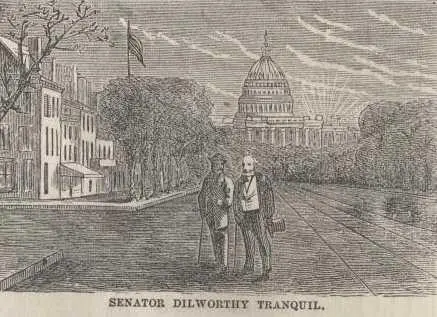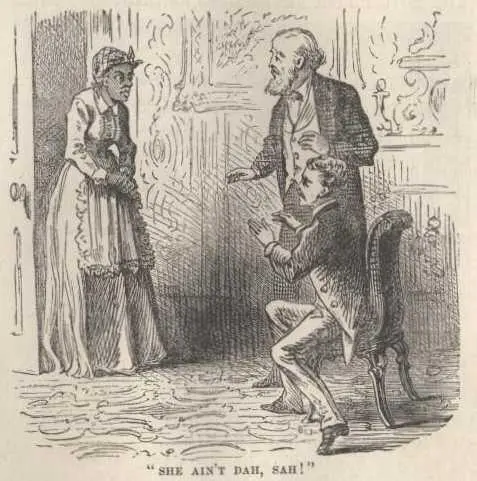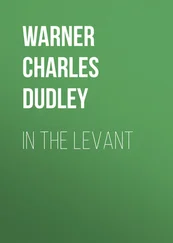Charles Warner - The Gilded Age / A tale of today
Здесь есть возможность читать онлайн «Charles Warner - The Gilded Age / A tale of today» весь текст электронной книги совершенно бесплатно (целиком полную версию без сокращений). В некоторых случаях можно слушать аудио, скачать через торрент в формате fb2 и присутствует краткое содержание. Год выпуска: 2004, Жанр: Классическая проза, на английском языке. Описание произведения, (предисловие) а так же отзывы посетителей доступны на портале библиотеки ЛибКат.
- Название:The Gilded Age / A tale of today
- Автор:
- Жанр:
- Год:2004
- ISBN:нет данных
- Рейтинг книги:3 / 5. Голосов: 1
-
Избранное:Добавить в избранное
- Отзывы:
-
Ваша оценка:
- 60
- 1
- 2
- 3
- 4
- 5
The Gilded Age / A tale of today: краткое содержание, описание и аннотация
Предлагаем к чтению аннотацию, описание, краткое содержание или предисловие (зависит от того, что написал сам автор книги «The Gilded Age / A tale of today»). Если вы не нашли необходимую информацию о книге — напишите в комментариях, мы постараемся отыскать её.
The Gilded Age / A tale of today — читать онлайн бесплатно полную книгу (весь текст) целиком
Ниже представлен текст книги, разбитый по страницам. Система сохранения места последней прочитанной страницы, позволяет с удобством читать онлайн бесплатно книгу «The Gilded Age / A tale of today», без необходимости каждый раз заново искать на чём Вы остановились. Поставьте закладку, и сможете в любой момент перейти на страницу, на которой закончили чтение.
Интервал:
Закладка:

"It is, under Providence, a good night's work, Mr. Sterling. The government has founded an institution which will remove half the difficulty from the southern problem. And it is a good thing for the Hawkins heirs, a very good thing. Laura will be almost a millionaire."
"Do you think, Mr. Dilworthy, that the Hawkinses will get much of the money?" asked Philip innocently, remembering the fate of the Columbus River appropriation.
The Senator looked at his companion scrutinizingly for a moment to see if he meant anything personal, and then replied,
"Undoubtedly, undoubtedly. I have had their interests greatly at heart. There will of course be a few expenses, but the widow and orphans will realize all that Mr. Hawkins, dreamed of for them."
The birds were singing as they crossed the Presidential Square, now bright with its green turf and tender foliage. After the two had gained the steps of the Senator's house they stood a moment, looking upon the lovely prospect:
"It is like the peace of God," said the Senator devoutly.
Entering the house, the Senator called a servant and said, "Tell Miss Laura that we are waiting to see her. I ought to have sent a messenger on horseback half an hour ago," he added to Philip, "she will be transported with our victory. You must stop to breakfast, and see the excitement." The servant soon came back, with a wondering look and reported,
"Miss Laura ain't dah, sah. I reckon she hain't been dah all night!"

The Senator and Philip both started up. In Laura's room there were the marks of a confused and hasty departure, drawers half open, little articles strewn on the floor. The bed had not been disturbed. Upon inquiry it appeared that Laura had not been at dinner, excusing herself to Mrs. Dilworthy on the plea of a violent headache; that she made a request to the servants that she might not be disturbed.
The Senator was astounded. Philip thought at once of Col. Selby. Could Laura have run away with him? The Senator thought not. In fact it could not be. Gen. Leffenwell, the member from New Orleans, had casually told him at the house last night that Selby and his family went to New York yesterday morning and were to sail for Europe to-day.
Philip had another idea which, he did not mention. He seized his hat, and saying that he would go and see what he could learn, ran to the lodgings of Harry; whom he had not seen since yesterday afternoon, when he left him to go to the House.
Harry was not in. He had gone out with a hand-bag before six o'clock yesterday, saying that he had to go to New York, but should return next day. In Harry's-room on the table Philip found this note:
"Dear Mr. Brierly:—Can you meet me at the six o'clock train, and be my escort to New York? I have to go about this University bill, the vote of an absent member we must have here, Senator Dilworthy cannot go.
Yours, L. H."
"Confound it," said Phillip, "the noodle has fallen into her trap. And she promised she would let him alone."
He only stopped to send a note to Senator Dilworthy, telling him what he had found, and that he should go at once to New York, and then hastened to the railway station. He had to wait an hour for a train, and when it did start it seemed to go at a snail's pace.
Philip was devoured with anxiety. Where could they have gone? What was Laura's object in taking Harry? Had the flight anything to do with Selby? Would Harry be such a fool as to be dragged into some public scandal?
It seemed as if the train would never reach Baltimore. Then there was a long delay at Havre de Grace. A hot box had to be cooled at Wilmington. Would it never get on? Only in passing around the city of Philadelphia did the train not seem to go slow. Philip stood upon the platform and watched for the Boltons' house, fancied he could distinguish its roof among the trees, and wondered how Ruth would feel if she knew he was so near her.
Then came Jersey, everlasting Jersey, stupid irritating Jersey, where the passengers are always asking which line they are on, and where they are to come out, and whether they have yet reached Elizabeth. Launched into Jersey, one has a vague notion that he is on many lines and no one in particular, and that he is liable at any moment to come to Elizabeth. He has no notion what Elizabeth is, and always resolves that the next time he goes that way, he will look out of the window and see what it is like; but he never does. Or if he does, he probably finds that it is Princeton or something of that sort. He gets annoyed, and never can see the use of having different names for stations in Jersey. By and by there is Newark, three or four Newarks apparently; then marshes; then long rock cuttings devoted to the advertisements of patent medicines and ready-made, clothing, and New York tonics for Jersey agues, and Jersey City is reached.
On the ferry-boat Philip bought an evening paper from a boy crying "'Ere's the Evening Gram, all about the murder," and with breathless haste—ran his eyes over the following:
SHOCKING MURDER!!!
TRAGEDY IN HIGH LIFE!!
A BEAUTIFUL WOMAN SHOOTS A DISTINGUISHED
CONFEDERATE SOLDIER AT THE SOUTHERN HOTEL!!!
JEALOUSY THE CAUSE!!!
This morning occurred another of those shocking murders which have become the almost daily food of the newspapers, the direct result of the socialistic doctrines and woman's rights agitations, which have made every woman the avenger of her own wrongs, and all society the hunting ground for her victims.
About nine o'clock a lady deliberately shot a man dead in the public parlor of the Southern Hotel, coolly remarking, as she threw down her revolver and permitted herself to be taken into custody, "He brought it on himself." Our reporters were immediately dispatched to the scene of the tragedy, and gathered the following particulars.
Yesterday afternoon arrived at the hotel from Washington, Col. George Selby and family, who had taken passage and were to sail at noon to-day in the steamer Scotia for England. The Colonel was a handsome man about forty, a gentleman of wealth and high social position, a resident of New Orleans. He served with distinction in the confederate army, and received a wound in the leg from which he has never entirely recovered, being obliged to use a cane in locomotion.
This morning at about nine o'clock, a lady, accompanied by a gentleman, called at the office of the hotel and asked for Col. Selby. The Colonel was at breakfast. Would the clerk tell him that a lady and gentleman wished to see him for a moment in the parlor? The clerk says that the gentleman asked her, "What do you want to see him for?" and that she replied, "He is going to Europe, and I ought to just say good by."
Col. Selby was informed; and the lady and gentleman were shown to the parlor, in which were at the time three or four other persons. Five minutes after two shots were fired in quick succession, and there was a rush to the parlor from which the reports came.
Col. Selby was found lying on the floor, bleeding, but not dead. Two gentlemen, who had just come in, had seized the lady, who made no resistance, and she was at once given in charge of a police officer who arrived. The persons who were in the parlor agree substantially as to what occurred. They had happened to be looking towards the door when the man—Col. Selby—entered with his cane, and they looked at him, because he stopped as if surprised and frightened, and made a backward movement. At the same moment the lady in the bonnet advanced towards him and said something like, "George, will you go with me?" He replied, throwing up his hand and retreating, "My God I can't, don't fire," and the next instants two shots were heard and he fell. The lady appeared to be beside herself with rage or excitement, and trembled very much when the gentlemen took hold of her; it was to them she said, "He brought it on himself."
Читать дальшеИнтервал:
Закладка:
Похожие книги на «The Gilded Age / A tale of today»
Представляем Вашему вниманию похожие книги на «The Gilded Age / A tale of today» списком для выбора. Мы отобрали схожую по названию и смыслу литературу в надежде предоставить читателям больше вариантов отыскать новые, интересные, ещё непрочитанные произведения.
Обсуждение, отзывы о книге «The Gilded Age / A tale of today» и просто собственные мнения читателей. Оставьте ваши комментарии, напишите, что Вы думаете о произведении, его смысле или главных героях. Укажите что конкретно понравилось, а что нет, и почему Вы так считаете.












